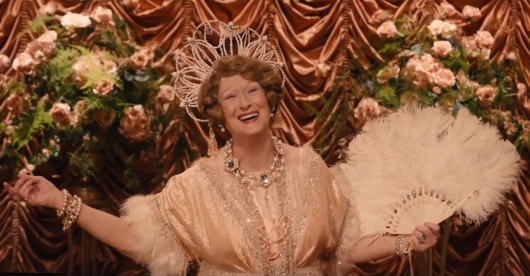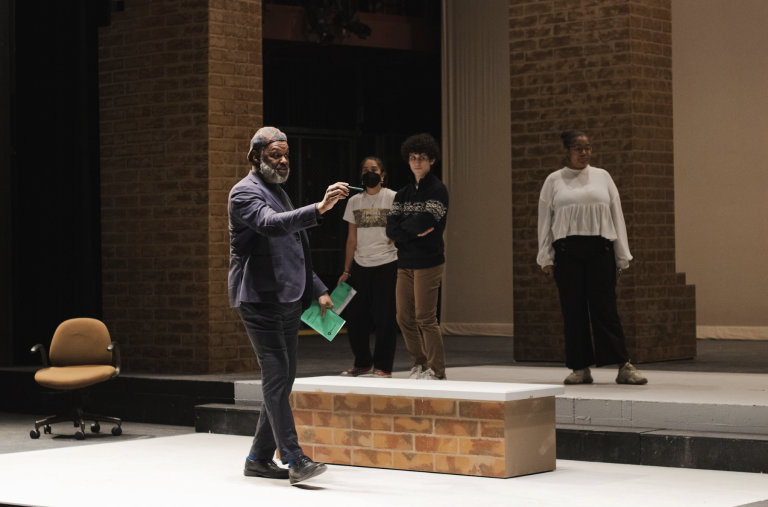Trip Slaymaker ’18

Meryl Streep plays Florence Foster Jenkins in the movie of the same name.
A&E Editor
In many ways, Meryl Streep’s latest character represents the ultimate in perseverance. Florence Foster Jenkins was born without even the slightest singing ability, and yet she would go on to perform to a sold-out Carnegie Hall. What she did have was a natural confidence and firm personality that helped her persevere against the truth that her voice was ludicrously, hilariously off-key whenever she opened her mouth.
Florence Foster Jenkins drops us into the wartime New York City life of an heiress and beloved music patron. This woman seems down-to-earth, if a little eccentric at first, but Florence Foster Jenkins commands the attention of any room she is in. Her character elaborates and becomes clearer as the film progresses, but there is an entire first act before the big reveal. When Jenkins expresses a desire to take up singing again to her husband (Hugh Grant) we finally see what silliness this character is capable of.
Streep was the only choice to play this role, in part because of the need for an emotionally convincing performance that few could get right. The other factor in casting could only have been the great wealth of funny noises involved in playing Florence Foster Jenkins. Streep imitates the real woman’s voice with ease, sometimes whooping, sometimes shrieking. These are the funniest scenes in the movie, and of course, Meryl Streep really leans into it. The character has no knowledge of her own vocal shortcomings, in fact, she believes herself to be one of the finest singers of her time. This, coupled with Jenkins’ love of exaggerated stage costumes makes the character incredibly fun, but also slightly tragic.
Therein lies one of the challenges of balancing Florence Foster Jenkins: how can the weight of such a fleshed out, visually fascinating and hilarious Meryl Streep character be matched? The rest of the film begins to lag behind the predestined success of its beloved top-billed actress. For this reason character’s like Florence’s young pianist Cosme Mcmoon, played indistinctly by The Big Bang Theory’s Simon Helberg, are doomed to fade into the background.
Hugh Grant’s character, St. Clair Bayfield, husband to Florence, fares better. Grant’s character worships Florence and spends most of his time working to help his wife achieve her dreams of singing at Carnegie Hall. He must also protect her from anyone who might burst the bubble of her happiness by telling her the truth about her voice. More light is shed on both characters and their relationship when it is revealed that Bayfield has a younger mistress and that Florence knows about her.
Keeping this situation from spinning out of control seems like an impossible task, but Bayfield tries his hardest, inviting only “music lovers” to Florence’s recitals, that is, pre-interviewed audience members and very close friends. Florence performs for these audiences, oblivious to their muffled laughter, while Bayfield watches the crowd like a hawk, and removes any member who might become too visibly hysterical.
A cult following begins to circulate around Florence Foster Jenkins, and audiences start to view her either as a high-concept comedy routine or as a lesson in courage and personal conviction. Records begin to be released, and thousands are turned away from her sold-out performances. The singer herself is still butchering every song, but at this point, it’s a possibility that perhaps Florence only hears what she wants to. Though at times it feels like the crueler choice, Bayfield’s work to keep Florence untouched by the knowledge of her own mediocrity is an attempt to preserve her innocence.
Director Stephen Frears does not achieve the kind of lyrical storytelling of some of his past films, like The Queen, but his direction of Meryl Streep feels as natural as breathing. As a film, Florence Foster Jenkins is fizzy and light, full of satisfying moments, but it works best when viewed as a character study by Streep. The depth and hilarity of her performance is reason enough to see this movie. Florence Foster Jenkins will play at Cinestudio from Wednesday, Sept. 28 to Saturday, Oct. 1.
Cinestudio Preview: Florence Foster Jenkins






+ There are no comments
Add yours